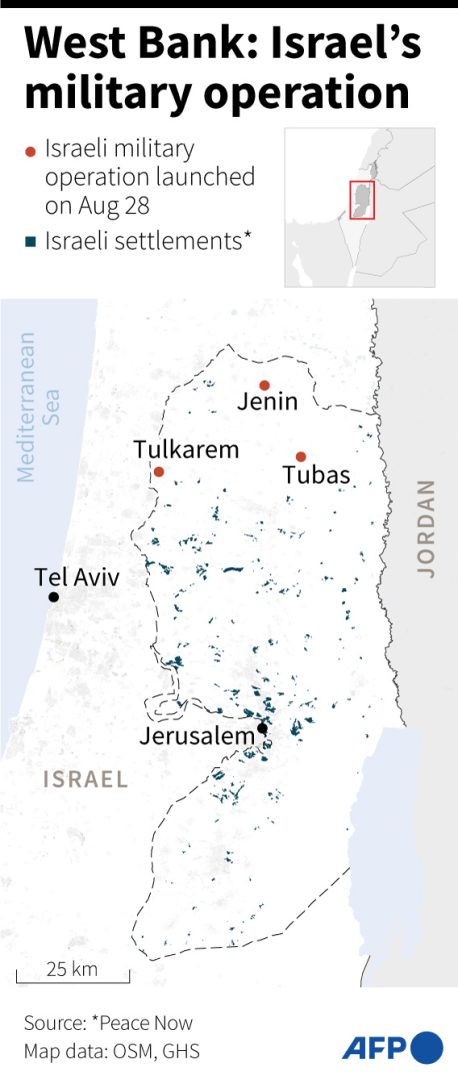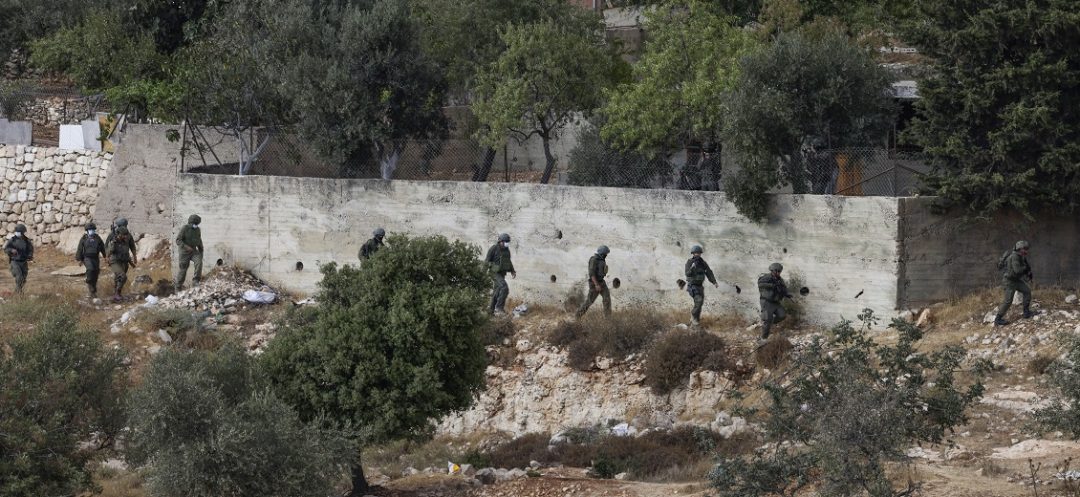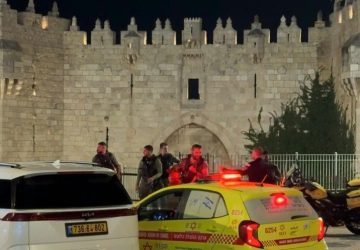In the early hours of Wednesday, August 28, the Israeli military announced a major operation in the northern part of the occupied West Bank, targeting localities such as Jenin, Tubas, and Tulkarem. This operation is the largest in the area since October 7.
Although this operation is more extensive than previous ones, it is part of a broader pattern. While the world’s attention remains fixed on the Gaza Strip, Israel is intensifying its pressure on this other area of the Palestinian territories.
Factsheet
Located west of the Jordan River, from which it derives its name, the West Bank spans approximately 5,865 km² and is bordered by Israel, Jordan, and the Dead Sea. Its position on the river’s western bank makes it particularly suited for agriculture. Around three million Palestinians live there, with a median age of 21.9 years.
 In addition to East Jerusalem, the population is mainly concentrated in the cities of Nablus, Ramallah, Jenin, Tulkarem, Qalqilya, and especially Hebron (also known as Al-Khalil).
In addition to East Jerusalem, the population is mainly concentrated in the cities of Nablus, Ramallah, Jenin, Tulkarem, Qalqilya, and especially Hebron (also known as Al-Khalil).
They live alongside around 470,000 Israeli settlers, a number that is steadily increasing. These settlers establish colonies and illegal outposts, under international law, on land that has been forcibly taken from Palestinian families.
Historical Context
Historically, the West Bank was part of the British Mandate for Palestine after World War I. Following the end of the mandate in 1948, the establishment of the State of Israel, and the subsequent 1948-1949 war, Jordan annexed the West Bank.
This status continued until the Six-Day War in 1967, when the Israeli military took control of the territory. The West Bank then came under Israeli military administration, and Israeli settlements began expanding in the region.
The increase in these settlements led to rising tensions with the Palestinian population, which eventually erupted into the First Intifada, a widespread Palestinian uprising against the occupation. The West Bank became a focal point for protests, clashes, and Israeli military repression.
Security Tiers
In 1994, the Oslo Accords were signed between Israel and the Palestine Liberation Organization (PLO). These agreements established the creation of an autonomous Palestinian Authority and initiated a peace process aimed at reaching a two-state solution. As part of this arrangement, the West Bank was divided into three zones.
Zone A, which is under complete Palestinian control (both civil and security), covers about 18% of the West Bank. This zone includes major Palestinian cities such as Ramallah, Nablus, and Bethlehem. The Palestinian Authority oversees both civil and security affairs in this area, with restricted access for Israelis.
Zone B has a mixed status, with Palestinian civil control and Israeli security control. It covers about 22% of the West Bank and includes rural areas and some towns. The Palestinian Authority is responsible for managing civil affairs in this zone.
Zone C, on the other hand, is under complete Israeli control (both civil and security), covering roughly 60% of the West Bank. This zone includes Israeli settlements, major roads, and large areas maintained in a state of underdevelopment by Tel Aviv. Palestinians in Zone C face stringent and discriminatory restrictions on construction and movement, unlike Israeli settlers.
The Challenges for the Palestinians
Palestinians view the West Bank as a vital part of their future independent state, alongside Gaza and East Jerusalem. Sovereignty over this territory is crucial for their aspirations of self-determination.
This sovereignty is significantly threatened by the construction and expansion of Israeli settlements which fragment the West Bank, restrict free movement, and jeopardize territorial continuity. The situation is similarly critical for East Jerusalem which Palestinians claim as the capital of their future state.
Israeli-imposed movement restrictions, including checkpoints, the separation barrier, and various military operations, significantly impact the daily lives of Palestinians in Zones B and C. These measures affect their economy, access to essential services, and social interactions.
The Challenges for the Israelis
From the Israeli perspective, the West Bank is seen as a crucial area for national security. Concerns about potential attacks from this territory lead Israel to enforce strict military control and to establish settlements as security outposts. Israel seeks to retain control over key strategic regions in the West Bank, such as the Jordan Valley, to oversee its eastern borders.
In addition to security concerns, there is a religious dimension. Many Jewish Israelis view the West Bank—referred to as “Judea and Samaria” in their terminology—as the historic heart of the Land of Israel. It houses important biblical sites, such as the Cave of the Patriarchs in Hebron.
Furthermore, the significant presence of Israeli settlers in the West Bank creates a situation that complicates any potential withdrawal of these territories without provoking substantial internal political turmoil in Israel. Settlers, supported by certain political factions, also act as a powerful lobby advocating for the territory to remain under Israeli control.
At the Heart of the Two-state Solution
For both sides, control over natural resources, especially water, is a critical issue. Currently, Israel controls a significant portion of the West Bank’s water resources, leading to tensions over how these essential resources are managed and allocated.
The Palestinians view this territory as a crucial part of their future state, with East Jerusalem as its capital. Yet, the ongoing presence of Israeli settlements and Israel’s expansionist policies make it increasingly difficult to establish a viable Palestinian state.
Negotiations for a two-state solution, envisioning Israel and a future Palestinian state living side by side, have reached an impasse. The talks are often stalled by disagreements over borders, security arrangements, the status of Jerusalem, and the right of return for Palestinian refugees.





